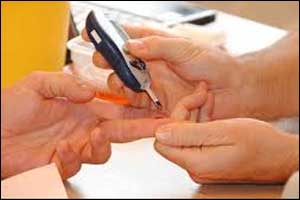- Home
- Editorial
- News
- Practice Guidelines
- Anesthesiology Guidelines
- Cancer Guidelines
- Cardiac Sciences Guidelines
- Critical Care Guidelines
- Dentistry Guidelines
- Dermatology Guidelines
- Diabetes and Endo Guidelines
- Diagnostics Guidelines
- ENT Guidelines
- Featured Practice Guidelines
- Gastroenterology Guidelines
- Geriatrics Guidelines
- Medicine Guidelines
- Nephrology Guidelines
- Neurosciences Guidelines
- Obs and Gynae Guidelines
- Ophthalmology Guidelines
- Orthopaedics Guidelines
- Paediatrics Guidelines
- Psychiatry Guidelines
- Pulmonology Guidelines
- Radiology Guidelines
- Surgery Guidelines
- Urology Guidelines
New Ebola portable test system available for emergency use : FDA

The U.S. Food and Drug Administration, FDA has issued emergency use authorization (EUA) for a rapid, single-use test for the detection of Ebola virus (Zaire ebolavirus) and permitted ts emergency use. This is the first test that uses a portable battery-operated reader, which can help provide clear diagnostic results outside of laboratories and in areas where patients are likely to be treated.
The test known as DPP Ebola Antigen System provides rapid diagnostic results with tests that can be performed in locations where a healthcare provider does not have access to authorized Ebola virus nucleic acid tests (PCR testing), which are highly sensitive but can only be performed in certain laboratory settings that are adequately equipped.
It has been authorized for use with capillary "fingerstick" whole blood, ethylenediaminetetraacetic acid (EDTA, an anticoagulant added to whole blood to prevent coagulation) venous whole blood and EDTA plasma. The DPP Ebola Antigen System should only be run in facilities, including treatment centers and public health clinics where patients are likely to be treated, and laboratories that are adequately equipped, trained and capable of such testing.
"The scourge of Ebola tragically demonstrates that we're a global community when it comes to public health protection. Infectious disease doesn't recognize nation states. Bacteria and viruses don't respect territorial boundaries. It takes a sustained, robust and globally coordinated effort to protect our nation and the global community from various infectious disease threats. We're all in this together. To that end, our FDA team of experts in drugs, vaccines and diagnostics continue to collaborate with our Federal, international and industry partners to employ our collective expertise, experiences from previous incidents, and resources to assist in the global response to the Ebola outbreak in the Democratic Republic of Congo," said FDA Commissioner Scott Gottlieb, M.D. "This EUA is part of the agency's ongoing efforts to help mitigate potential, future threats by making medical products that have the potential to prevent, diagnosis or treat available as quickly as possible. We're committed to helping the people of the DRC effectively confront and end the current Ebola outbreak. By authorizing the first fingerstick test with a portable reader, we hope to better arm healthcare providers in the field to more quickly detect the virus in patients and improve patient outcomes."
In 2014, during the Ebola outbreak in West Africa, an emergency was declared by the Secretary of Health and Human Services. While that outbreak has ended, ongoing, smaller Ebola outbreaks have continued, and the emergency declaration is still in place. Recent outbreaks in remote areas with limited resources can benefit from rapid diagnostic tools, and the issuance of an EUA for the DPP Ebola Antigen System is an important step in addressing these outbreaks.
While today's action will increase access to diagnostic tools for healthcare providers who may not have otherwise been equipped to perform tests, it is important to note that a negative result from the DPP Ebola Antigen System, especially in patients with signs and symptoms of EVD, should not be used as the sole basis for patient management decisions. The diagnosis of EVD must be made based on multiple factors such as history, signs, symptoms, exposure likelihood and other laboratory evidence in addition to the detection of Ebola virus.

Disclaimer: This site is primarily intended for healthcare professionals. Any content/information on this website does not replace the advice of medical and/or health professionals and should not be construed as medical/diagnostic advice/endorsement or prescription. Use of this site is subject to our terms of use, privacy policy, advertisement policy. © 2020 Minerva Medical Treatment Pvt Ltd